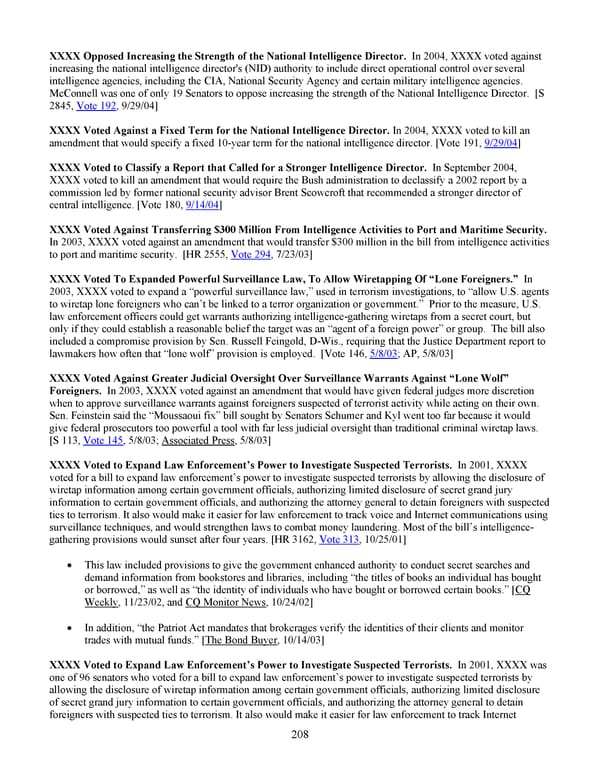XXXX Opposed Increasing the Strength of the National Intelligence Director. In 2004, XXXX voted against increasing the national intelligence director's (NID) authority to include direct operational control over several intelligence agencies, including the CIA, National Security Agency and certain military intelligence agencies. McConnell was one of only 19 Senators to oppose increasing the strength of the National Intelligence Director. [S 2845, Vote 192, 9/29/04] XXXX Voted Against a Fixed Term for the National Intelligence Director. In 2004, XXXX voted to kill an amendment that would specify a fixed 10-year term for the national intelligence director. [Vote 191, 9/29/04] XXXX Voted to Classify a Report that Called for a Stronger Intelligence Director. In September 2004, XXXX voted to kill an amendment that would require the Bush administration to declassify a 2002 report by a commission led by former national security advisor Brent Scowcroft that recommended a stronger director of central intelligence. [Vote 180, 9/14/04] XXXX Voted Against Transferring $300 Million From Intelligence Activities to Port and Maritime Security. In 2003, XXXX voted against an amendment that would transfer $300 million in the bill from intelligence activities to port and maritime security. [HR 2555, Vote 294, 7/23/03] XXXX Voted To Expanded Powerful Surveillance Law, To Allow Wiretapping Of “Lone Foreigners.” In 2003, XXXX voted to expand a “powerful surveillance law,” used in terrorism investigations, to “allow U.S. agents to wiretap lone foreigners who can’t be linked to a terror organization or government.” Prior to the measure, U.S. law enforcement officers could get warrants authorizing intelligence-gathering wiretaps from a secret court, but only if they could establish a reasonable belief the target was an “agent of a foreign power” or group. The bill also included a compromise provision by Sen. Russell Feingold, D-Wis., requiring that the Justice Department report to lawmakers how often that “lone wolf” provision is employed. [Vote 146, 5/8/03; AP, 5/8/03] XXXX Voted Against Greater Judicial Oversight Over Surveillance Warrants Against “Lone Wolf” Foreigners. In 2003, XXXX voted against an amendment that would have given federal judges more discretion when to approve surveillance warrants against foreigners suspected of terrorist activity while acting on their own. Sen. Feinstein said the “Moussaoui fix” bill sought by Senators Schumer and Kyl went too far because it would give federal prosecutors too powerful a tool with far less judicial oversight than traditional criminal wiretap laws. [S 113, Vote 145, 5/8/03; Associated Press, 5/8/03] XXXX Voted to Expand Law Enforcement’s Power to Investigate Suspected Terrorists. In 2001, XXXX voted for a bill to expand law enforcement’s power to investigate suspected terrorists by allowing the disclosure of wiretap information among certain government officials, authorizing limited disclosure of secret grand jury information to certain government officials, and authorizing the attorney general to detain foreigners with suspected ties to terrorism. It also would make it easier for law enforcement to track voice and Internet communications using surveillance techniques, and would strengthen laws to combat money laundering. Most of the bill’s intelligence- gathering provisions would sunset after four years. [HR 3162, Vote 313, 10/25/01] This law included provisions to give the government enhanced authority to conduct secret searches and demand information from bookstores and libraries, including “the titles of books an individual has bought or borrowed,” as well as “the identity of individuals who have bought or borrowed certain books.” [CQ Weekly, 11/23/02, and CQ Monitor News, 10/24/02] In addition, “the Patriot Act mandates that brokerages verify the identities of their clients and monitor trades with mutual funds.” [The Bond Buyer, 10/14/03] XXXX Voted to Expand Law Enforcement’s Power to Investigate Suspected Terrorists. In 2001, XXXX was one of 96 senators who voted for a bill to expand law enforcement’s power to investigate suspected terrorists by allowing the disclosure of wiretap information among certain government officials, authorizing limited disclosure of secret grand jury information to certain government officials, and authorizing the attorney general to detain foreigners with suspected ties to terrorism. It also would make it easier for law enforcement to track Internet 208
 HRC vote skeleton Page 222 Page 224
HRC vote skeleton Page 222 Page 224